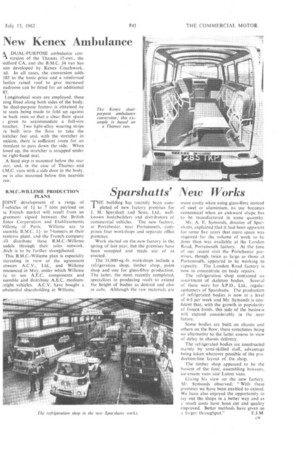Sparshatts' New Works
Page 39

If you've noticed an error in this article please click here to report it so we can fix it.
THE building has recently been corn": pleted of new factory premises for J. H: Sparshatt and Sons, Ltd., wellknown bodybuilders and distributors of commercial vehicles. The new factory. at Portchester, near Portsmouth, comprises four workshops and separate office premises.
Work started on the new factory in the spring of last year, but the premises have been occupied and made use of as erected.
The 31,000-sq.-ft. workshops include a refrigeration shop, timber shop, paint shop and one for glass-fibre production. The latter, the most recently completed, specializes in producing roofs to extend the height of bodies as desired and also in cabs. Although the raw materials are more costly when using glassfibre instead of steel or aluminium, its use becomes economical when an awkward shape has to be manufactured in some quantity.
Mr. A. E. Symonds, director of Spar
shafts, explained that it had been apparent for some five years that more space was required for the volume of work to be done than was available at the London Road, Portsmouth. factory.. At the time of our recent visit the Portchester premises, though twice as large. as those at Portsmouth, appeared to be working to capacity. The London Road factory is now to concentrate on body repairs.
The refrigeration Shop contained an
assortment of skeleton bodies: Several of these were for S,P.D., Ltd.. regtilar customers of Sparshatts.. The production of refrigerated bodies is now at a level of 4-5 per Week and Mr. Symonds is Confident that, with the growth in popularity of frozen foods, this side of the business will expand considerably in the near future.
Some bodies are built on chassis and others on the floor, there sometimes being no alternative to the tatter course in view of delay in chassis delivery. '
The refrigerated bodies are constructed mainly by semi-skilled staff, advantage being taken wherever possible of the production-line layout of the shop.
The timber shop appeared to be the busiest of the four, assembling boxvans, ice-cream vans and Luton vans.
Giving his view on the new factory, Mr. Symonds observed: "With these • premises we have been enabled to extend.
We have also enjoyed the opportunity to lay out the shops in a better way and as a result costs have been cut and quality improved. Better methods have given us a larger throughput." E.J.M.












































































































